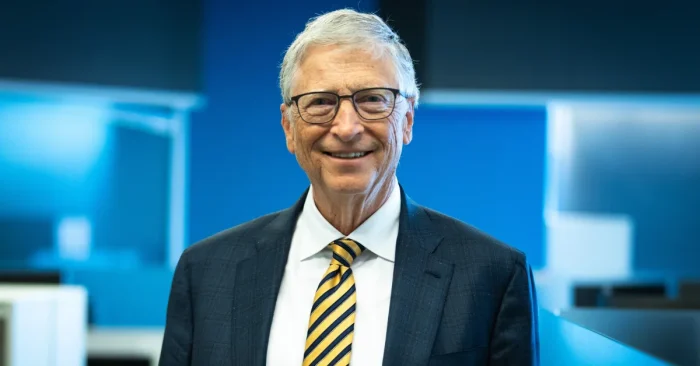Bill Gates – Biography
Early Life and Education
Bill Gates was born on October 28, 1955, in Seattle, Washington. Raised in an upper-middle-class family, Gates displayed an early interest in computers and technology. His father, William H. Gates Sr., was a prominent lawyer, and his mother, Mary Maxwell Gates, served on the boards of several major corporations. Gates attended the prestigious Lakeside School, where he was first introduced to computer programming at age 13. It was at Lakeside that Gates met Paul Allen, his future business partner, and together they began experimenting with computer systems, laying the foundation for their future ventures.
Founding Microsoft
In 1973, Gates enrolled at Harvard University but soon became consumed by his passion for software development. In 1975, after reading about the Altair 8800, one of the first personal computers, Gates and Allen saw an opportunity to develop software for this emerging market. They left Harvard and founded Microsoft, a combination of “microcomputer” and “software.” Their first major success came with the development of a BASIC interpreter for the Altair, which opened doors for further partnerships and opportunities.
Microsoft’s Rise to Dominance
Microsoft’s breakthrough came in 1980 when IBM chose them to provide an operating system for their first personal computer. Gates negotiated a licensing deal that allowed Microsoft to retain rights to the operating system, which became MS-DOS. This decision proved to be a masterstroke, as it allowed Microsoft to supply its software to multiple hardware manufacturers, rapidly expanding its market reach. In 1985, Microsoft released Windows, a graphical interface that revolutionized personal computing. Under Gates’ leadership, Microsoft dominated the software industry, with Windows becoming the standard operating system for millions of computers worldwide.
Philosophy and Leadership Style
Gates was known for his intense work ethic, analytical mind, and competitive spirit. He fostered a culture of innovation at Microsoft, constantly pushing his teams to improve products and stay ahead of competitors. His ability to foresee the growing importance of personal computing and software allowed Microsoft to become a tech powerhouse. Gates’ leadership style emphasized hands-on involvement, rigorous debate, and a relentless focus on excellence, helping drive the company’s sustained growth and success.
Philanthropy and the Bill & Melinda Gates Foundation
In 2000, Gates transitioned from his day-to-day role at Microsoft to focus on philanthropy, establishing the Bill & Melinda Gates Foundation with his then-wife, Melinda. The foundation quickly became one of the largest charitable organizations in the world, focusing on global health, education, poverty reduction, and disease eradication. Notably, the foundation has made significant strides in combating diseases like malaria, polio, and HIV/AIDS. Gates’ philanthropic efforts have earned him widespread respect, as he shifted his considerable wealth and influence toward solving some of the world’s most pressing problems.
Public Image and Influence
Over the years, Gates has become one of the most recognized and influential figures globally. He has been praised for his vision and criticized for Microsoft’s aggressive business tactics during its rise. However, his transformation from a hard-charging tech executive to a globally admired philanthropist has significantly reshaped his public image. Gates regularly shares insights on technology, global health, and climate change, using his platform to advocate for science-based solutions and long-term thinking.
Personal Life
Gates married Melinda French in 1994, and the couple has three children. In 2021, they announced their divorce but have continued to work together on philanthropic projects. Gates is known for his disciplined lifestyle, love for reading, and curiosity about science and innovation. Despite his wealth, he maintains a relatively modest personal life compared to many of his billionaire peers, focusing instead on intellectual pursuits and charitable work.
Legacy and Continued Impact
Bill Gates’ legacy is multifaceted. As the co-founder of Microsoft, he played a pivotal role in making personal computing accessible to millions, transforming how people work and communicate. As a philanthropist, he has dedicated much of his fortune to improving global health, reducing poverty, and addressing climate change. His ability to evolve from a driven entrepreneur to a global humanitarian underscores his lasting influence on both the tech industry and the broader world.
Frequently Asked Questions (FAQs)
When was Bill Gates born?
He was born on October 28, 1955.
What is Bill Gates known for?
He is best known as the co-founder of Microsoft and one of the world’s leading philanthropists.
Is Bill Gates still involved with Microsoft?
While no longer involved in day-to-day operations, Gates remains a technical advisor and continues to influence technology and philanthropy.
What does the Bill & Melinda Gates Foundation focus on?
The foundation focuses on global health, education, poverty reduction, and combating infectious diseases worldwide.
What is Bill Gates’ net worth?
As of 2025, his net worth is estimated to be around $130 billion, though he has donated a significant portion to charitable causes.






